-
ORIGINAL ARTICLE11-29-2022
Factors associated with bronchopulmonary aspiration: a national-based study
Revista Brasileira de Enfermagem. 2022;75(3):e20210220
Abstract
ORIGINAL ARTICLEFactors associated with bronchopulmonary aspiration: a national-based study
Revista Brasileira de Enfermagem. 2022;75(3):e20210220
DOI 10.1590/0034-7167-2021-0220
Views0See moreABSTRACT
Objectives:
to determine the prevalence of bronchopulmonary aspiration in the Brazilian scenario, the factors associated with the incident and the variables associated with death.
Methods:
a cross-sectional and analytical study, carried out from analysis of notifications of incidents related to bronchopulmonary aspiration of the Health Surveillance Notification System, from January 2014 to December 2018.
Results:
of the 264,590 notifications, 553 referred to aspiration, whose prevalence rate was 0.21%. There was an association between the event and age, ethnicity, main medical diagnosis, country region, service type, health unit and consequences for patients. Furthermore, four independent predictor variables for death were found: living in the North or South regions, being elderly and receiving healthcare at night.
Conclusions:
the prevalence rate of bronchopulmonary aspiration was small, but with a negative impact on patients.
-
ORIGINAL ARTICLE11-29-2022
Undernutrition and associated factors in primary schoolchildren in Lokossa, Benin: a cross-sectional study
Revista Brasileira de Enfermagem. 2022;75(3):e20210254
Abstract
ORIGINAL ARTICLEUndernutrition and associated factors in primary schoolchildren in Lokossa, Benin: a cross-sectional study
Revista Brasileira de Enfermagem. 2022;75(3):e20210254
DOI 10.1590/0034-7167-2021-0254
Views1See moreABSTRACT
Objectives:
to estimate the prevalence of stunting and thinness and sociodemographic, household, family, dietary, and scholar associated factors in schoolchildren living in Lokossa-Benin.
Methods:
a survey conducted in a probabilistic sample (n=615) of primary schoolchildren (8-17 years), from 12/2018 to 01/2019, using structured questionnaire and 24-hour dietary recall. Thinness and stunting were defined as Height-for-age and Body Mass Index-for-age below-2 standard deviations, respectively. Associations were estimated by chi-square test and logistic regression.
Results:
thinness and stunting prevalence was 13.1% (95%CI:9.0-18.7) and 25.5% (95%CI:20.6-31.2), respectively. Odds of thinness were higher among older schoolchildren and those who experienced hunger at school. Odds of stunting increased with age, low diet diversity, experiencing hunger at school, and having school meal five days a week (OR:2.09; 95%CI:1.29-3.36).
Conclusions:
stunting was the most common problem. Older schoolchildren and those with food deprivation or poor diet diversity were the most affected.
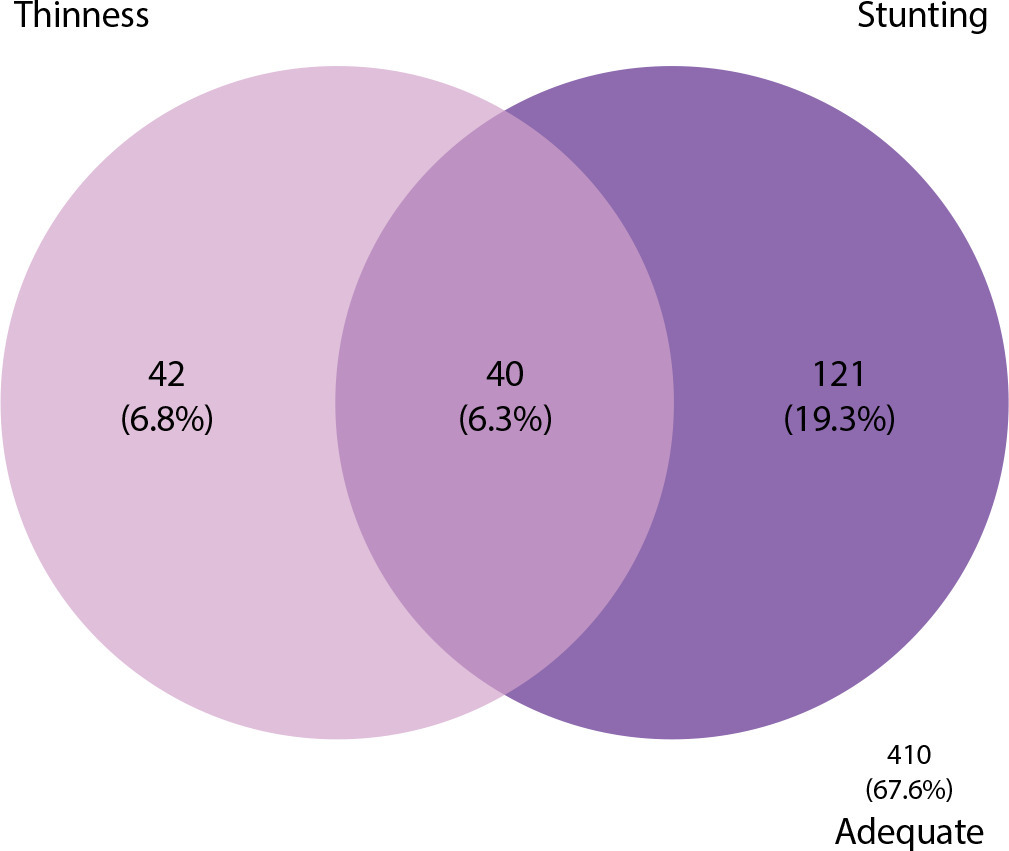
-
ORIGINAL ARTICLE11-29-2022
Outlining the therapeutic itineraries of children with disabilities in the professional health care subsystem
Revista Brasileira de Enfermagem. 2022;75(3):e20210169
Abstract
ORIGINAL ARTICLEOutlining the therapeutic itineraries of children with disabilities in the professional health care subsystem
Revista Brasileira de Enfermagem. 2022;75(3):e20210169
DOI 10.1590/0034-7167-2021-0169
Views0See moreABSTRACT
Objectives:
to identify the outlining of therapeutic itineraries of families of children with disabilities in the professional health care subsystem.
Methods:
qualitative research carried out in two specialized services in the state of Ceará, with 41 family members interviewed using the life path technique and reports submitted to descending hierarchical classification and similitude analysis, with the help of the IRaMuTeQ software and the theoretical framework of health care systems.
Results:
the classes described the families’ itineraries in five paths, related to faith, support structures, medical behaviors, professionals, and health services. The professional subsystem stood out as deficient in outlining the therapeutic itinerary for access to health care for children with disabilities, without promoting integration between services in the Care Network.
Final considerations:
the families’ therapeutic itineraries showed homogeneous discourse with themes related to the care of professionals and spiritual aspects.
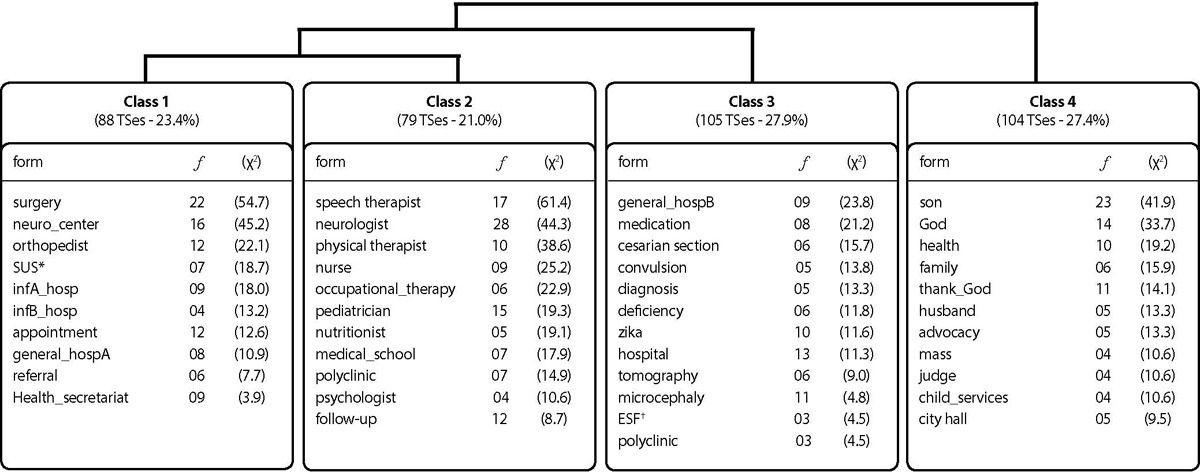
-
ORIGINAL ARTICLE11-29-2022
Ergonomics of anatomical bra models for breastfeeding: a contribution of nursing
Revista Brasileira de Enfermagem. 2022;75(3):e20210264
Abstract
ORIGINAL ARTICLEErgonomics of anatomical bra models for breastfeeding: a contribution of nursing
Revista Brasileira de Enfermagem. 2022;75(3):e20210264
DOI 10.1590/0034-7167-2021-0264
Views0See moreABSTRACT
Objectives:
to analyze the ergonomics of two models of breastfeeding bras.
Methods:
descriptive study carried out with 152 infants in a Brazilian university hospital. The prototypes were separated into two groups (A and B). To compare the two bra models, the Odds Ratio (OR) was used as a measure of the strength of the association. In subjective perceptions, the Modified Borg Scale, and the chi-square test of independence (χ2) were used. To compare the two prototypes, the Z test and logistic regression analysis were performed. A significance level of 5% was considered.
Results:
the bra in group B was more suitable for ergonomics of physical and psycho-aesthetic comfort than the bra in group A (p < 0.0001), according to the logistic regression tests.
Conclusions:
modeling B was ergonomically adequate, with usability and evaluation criteria centered on breastfeeding women.

-
ORIGINAL ARTICLE11-29-2022
Knowledge of caregivers and factors associated with neuropsychomotor development in children
Revista Brasileira de Enfermagem. 2022;75(3):e20210402
Abstract
ORIGINAL ARTICLEKnowledge of caregivers and factors associated with neuropsychomotor development in children
Revista Brasileira de Enfermagem. 2022;75(3):e20210402
DOI 10.1590/0034-7167-2021-0402
Views0See moreABSTRACT
Objectives:
to analyze the knowledge of caregivers and the factors associated with neuropsychomotor development in children.
Methods:
a cross-sectional study, with a quantitative approach, was conducted with 220 child-caregiver binomials attended in the public health services of the municipality of Parnaíba, State of Piauí. The study used the “Denver Test II” and the “Inventory of Child Development Knowledge”.
Results:
the study classified 197 children with natural development and 23 with suspicious development. Caregivers with a higher level of knowledge about child development were associated with children with better development. The study considered caregiver knowledge, gestational age, and exclusive breastfeeding as protective factors for appropriate neuropsychomotor development when used the regression model.
Conclusions:
actions aimed at indicators that presented positive associations must be implemented to improve child development, such as educational activities to increase the level of knowledge of caregivers, improvement of prenatal monitoring, and encouragement of breastfeeding.
-
ORIGINAL ARTICLE11-29-2022
Ethics in nursing: categorization of legal processes
Revista Brasileira de Enfermagem. 2022;75(3):e20210099
Abstract
ORIGINAL ARTICLEEthics in nursing: categorization of legal processes
Revista Brasileira de Enfermagem. 2022;75(3):e20210099
DOI 10.1590/0034-7167-2021-0099
Views0See moreABSTRACT
Objectives:
to categorize factual elements of ethical-disciplinary nursing lawsuits in the state of Goiás.
Methods:
cross-sectional, retrospective study, based on secondary data obtained from ethical-disciplinary lawsuits filed at the Regional Nursing Council of Goiás (Coren-Goiás) between the years 2010 and 2019.
Results:
the highest number of lawsuits filed was in 2013 and 2014, with a greater frequency in the state capital. The majority came from the Nursing Ethics Committees and ex-officio complaints. The professional with most complaints was the nursing technician, aged between 31 and 40 years old, at the beginning of their career. The most common type of complaints referred to performing attributions that were not within the nursing competences.
Conclusions:
as a highlight are the contributions of this study to professional ethics in nursing and the clear need to consolidate these skills in nurses who are in training and in the continuous education for those already in the profession.
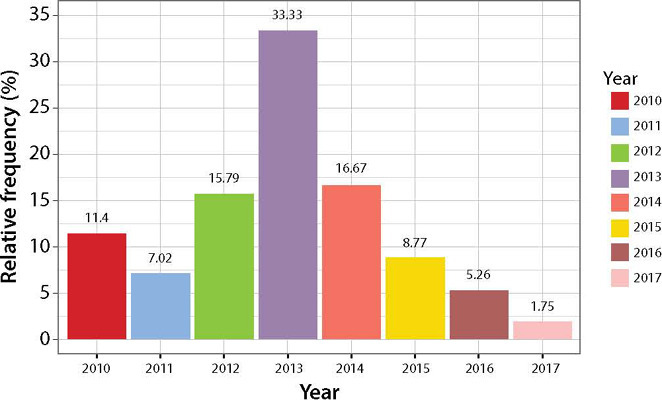
-
ORIGINAL ARTICLE11-29-2022
Exclusive breastfeeding and professionals from the family health strategy
Revista Brasileira de Enfermagem. 2022;75(3):e20200545
Abstract
ORIGINAL ARTICLEExclusive breastfeeding and professionals from the family health strategy
Revista Brasileira de Enfermagem. 2022;75(3):e20200545
DOI 10.1590/0034-7167-2020-0545
Views0See moreABSTRACT
Objectives:
to analyze the perception of health professionals about exclusive breastfeeding in Family Health Strategy units in the city of Macaé.
Methods:
qualitative study carried out in four units of the Family Health Strategy in the city of Macaé, Rio de Janeiro. Thirty health professionals were interviewed from March to May 2019. Textual contents were processed in the IRaMuTeQ® software by the Descending Hierarchical Classification.
Results:
professionals use different strategies for actions to promote, protect and support breastfeeding in prenatal consultations, but social and cultural determinants are important issues that interfere in this process, the involvement of the family being essential for the success of this practice.
Final Considerations:
health professionals, including nurses, need training and qualification to strengthen the support and social network of pregnant women and insert the family in the different strategies used to improve adherence to exclusive breastfeeding.

-
ORIGINAL ARTICLE11-29-2022
Specific health-related quality of life in Cerebrovascular accident survivors: associated factors
Revista Brasileira de Enfermagem. 2022;75(3):e20210407
Abstract
ORIGINAL ARTICLESpecific health-related quality of life in Cerebrovascular accident survivors: associated factors
Revista Brasileira de Enfermagem. 2022;75(3):e20210407
DOI 10.1590/0034-7167-2021-0407
Views0See moreABSTRACT
Objectives:
to identify factors associated with specific health-related quality of life in cerebrovascular accident, or stroke, survivors.
Methods:
cross-sectional study, carried out with 160 cerebrovascular accident survivors. Data were collected using the Barthel Index, Cerebrovascular Accident Specific Quality of Life Scale, and semi-structured instruments for sociodemographic and clinical data, analyzed by descriptive and inferential statistics.
Results:
health-related quality of life was associated with work activity (p=0.027), physical activity (p=0.007), functional capacity (p=0.001), presence of caregiver (<0.001), motor alteration (p = 0.001) and rehabilitation (p=0.003). The functionally dependent people were 14.61 times more likely to present low health-related quality of life, and those with motor impairment were 3.07 times more likely.
Conclusions:
it was evidenced that functional dependence and motor impairment increase the chance of low health-related quality of life in cerebrovascular accident survivors.
-
06-01-2015
Health promotion in supplementary health care: outsourcing, microregulation and implications for care
Revista Brasileira de Enfermagem. 2015;68(3):482-489
Abstract
Health promotion in supplementary health care: outsourcing, microregulation and implications for care
Revista Brasileira de Enfermagem. 2015;68(3):482-489
DOI 10.1590/0034-7167.2015680315i
Views1See moreABSTRACT
Objective:
to analyze health promotion programs in the supplementary health care.
Methods:
This was a multiple case study with a qualitative approach whose data were obtained from interviews with coordinators of providers contracted by the corporations of health insurance plans in Belo Horizonte, Minas Gerais. The data were submitted to Critical Discourse Analysis.
Results:
Home care has been described as the main action in the fi eld of health promotion transferred to the providers, followed by management of patients and cases, and the health education.groups. The existence of health promotion principles is questionable in all programs. Outsourcing is marked by a process with a division between cost and care management. Implications of this process occur within admission and interventions on the needs of the benefi ciaries.
Conclusions:
Statements revealed rationalization of cost, restructuring of work, and reproduction of the dominant logic of capital accumulation by the health insurance companies.
PlumX Metrics
- Citations
- Citation Indexes: 2
- Usage
- Full Text Views: 7483
- Abstract Views: 495
- Captures
- Readers: 33

-
ORIGINAL ARTICLE01-01-2019
Knowledge and behavior of professionals about bundled strategies of central venous catheter
Revista Brasileira de Enfermagem. 2019;72(1):50-56
Abstract
ORIGINAL ARTICLEKnowledge and behavior of professionals about bundled strategies of central venous catheter
Revista Brasileira de Enfermagem. 2019;72(1):50-56
DOI 10.1590/0034-7167-2018-0164
Views1See moreABSTRACT
Objective:
To investigate the factors that influence the knowledge and behavior of professionals of neonatal and pediatric units about bundled strategies of insertion of central venous catheter.
Method:
This is a cross-sectional study, conducted in one neonatal and one pediatric intensive care units in a public hospital in Belo Horizonte, Brazil, from April to July, 2016. The sample consisted of 255 professionals who answered a structured instrument. Descriptive and comparative analyses were made using the SPSS software.
Results:
The category nursing professional (p = 0.010), working hours of 12×36 scale (p < 0.001), training as a form of acquiring knowledge (p < 0.001) and participation in training programs (p < 0.001) are associated to greater knowledge about the bundle. Regarding behavior, no significant associations were observed.
Conclusion:
The study showed that there are factors that influence the knowledge about bundled strategies of insertion of central venous catheter, reflecting the need to consider these practices for making more effective educational practices in health care.
-
ORIGINAL ARTICLE12-13-2019
Factors associated with low Apgar in newborns in birth center
Revista Brasileira de Enfermagem. 2019;72:297-304
Abstract
ORIGINAL ARTICLEFactors associated with low Apgar in newborns in birth center
Revista Brasileira de Enfermagem. 2019;72:297-304
DOI 10.1590/0034-7167-2018-0924
Views1See moreABSTRACT
Objective:
to analyze factors associated with Apgar of 5 minutes less than 7 of newborns of women selected for care at the Center for Normal Birth (ANC).
Method:
a descriptive cross-sectional study with data from 9,135 newborns collected between July 2001 and December 2012. The analysis used absolute and relative frequency frequencies and bivariate analysis using Pearson’s chi-square test or the exact Fisher.
Results:
fifty-three newborns (0.6%) had Apgar less than 7 in the 5th minute. The multivariate analysis found a positive association between low Apgar and gestational age less than 37 weeks, gestational pathologies and intercurrences in labor. The presence of the companion was a protective factor.
Conclusion:
the Normal Birth Center is a viable option for newborns of low risk women as long as the protocol for screening low-risk women is followed.
-
ORIGINAL ARTICLE04-09-2020
Factors associated with the discontinuance of outpatient follow-up in neonatal units
Revista Brasileira de Enfermagem. 2020;73(3):e20180793
Abstract
ORIGINAL ARTICLEFactors associated with the discontinuance of outpatient follow-up in neonatal units
Revista Brasileira de Enfermagem. 2020;73(3):e20180793
DOI 10.1590/0034-7167-2018-0793
Views1See moreABSTRACT
Objectives:
to identify predisposing and enabling factors as well as the health needs associated with the discontinuance of outpatient follow-up of newborns who were hospitalized at neonatal intensive care unit.
Methods:
cross-sectional study, using the behavioral model of health services use. The study was composed of 358 mothers and newborns referred to the outpatient follow-up after discharge. Characterization, perception of social support, postnatal depression, and attendance to appointments data were collected, analyzed by the R software (3.3.1).
Results:
outpatient follow-up was discontinued by 31.28% of children in the first year after discharge. In multiple regression analysis, the chance of discontinuance was higher for newborns who used mechanical ventilation (OR = 1.68; 95%CI 1.04-2.72) and depended on technology (OR = 3.54; 95%CI 1.32-9.5).
Conclusions:
predisposing factors were associated with the discontinuance of follow-up; enabling factors and health needs did not present a significant association. Children with more complex health conditions require additional support to participate in follow-up programs, thus ensuring the continuity of care.

-
ORIGINAL ARTICLE02-22-2021
Analysis of vaccine loss due to temperature change
Revista Brasileira de Enfermagem. 2021;74(1):e20190762
Abstract
ORIGINAL ARTICLEAnalysis of vaccine loss due to temperature change
Revista Brasileira de Enfermagem. 2021;74(1):e20190762
DOI 10.1590/0034-7167-2019-0762
Views1See moreABSTRACT
Objectives:
to analyze vaccine losses in a Health Region in the Northwest of São Paulo.
Methods:
retrospective cross-sectional study with secondary data obtained from Temperature Change Notification Forms used by the Epidemiological Surveillance Group XXIX of São José do Rio Preto between 2010 and 2017. Descriptive and inferential analysis were performed using multiple linear regression and significance level of 95%.
Results:
in total, 341 notifications of temperature changes were analyzed, of which 70.1% were caused by structural reasons, 57.8% in industrial refrigerators and 91.2% in primary care services. Of the doses that suffered a change in temperature, 41.4% were lost and 58.6% were administered to the population. The highest percentage of lost doses compared to those applied occurred in smaller municipalities, although they reported less.
Conclusions:
nursing workers who work in vaccination rooms should make efforts to prevent temperature changes and avoid losses and higher public expenses.
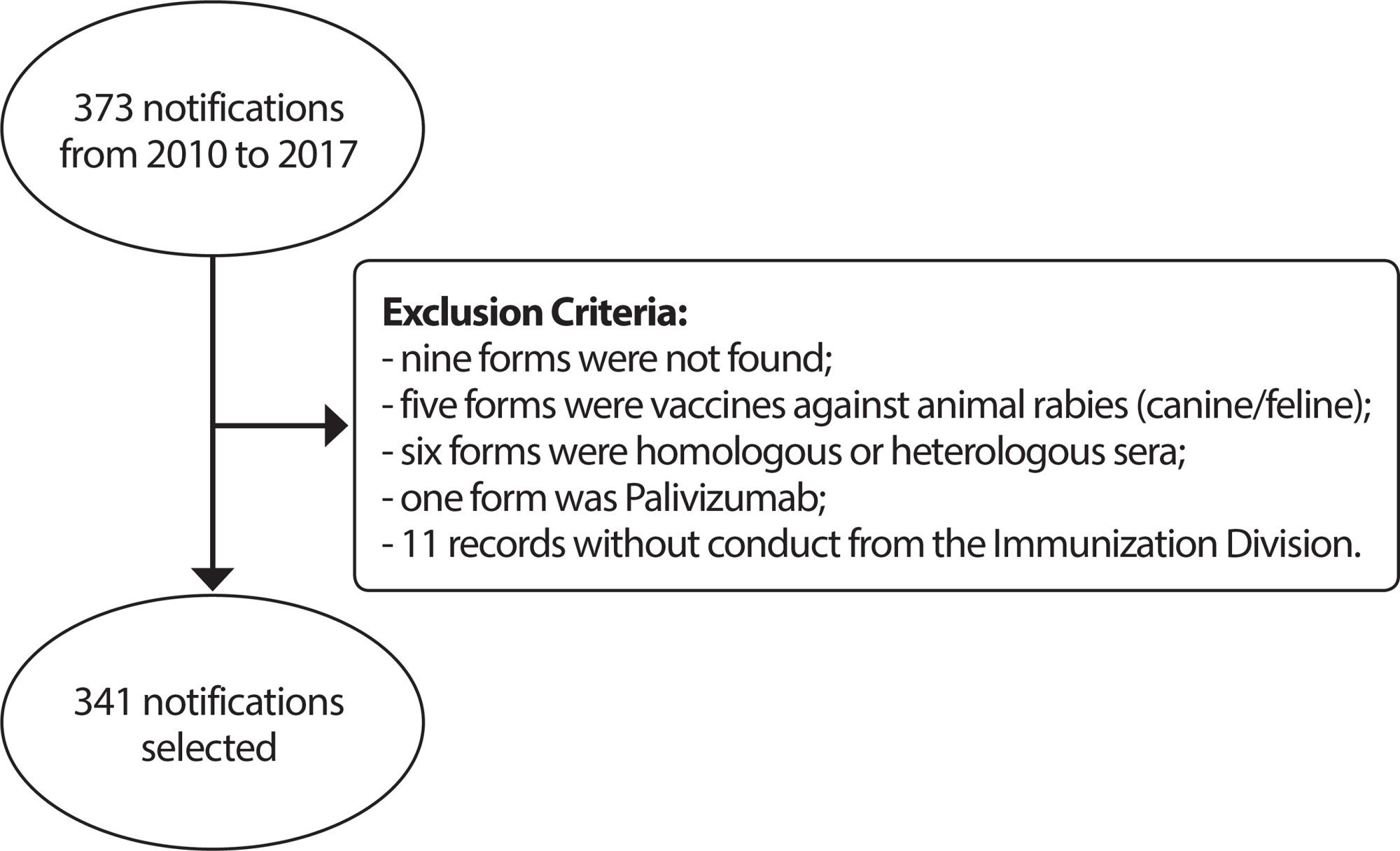
-
ORIGINAL ARTICLE09-26-2022
Participatory development of educational technology in seeking patient safety in maternity hospitals
Revista Brasileira de Enfermagem. 2022;75(5):e20210701
Abstract
ORIGINAL ARTICLEParticipatory development of educational technology in seeking patient safety in maternity hospitals
Revista Brasileira de Enfermagem. 2022;75(5):e20210701
DOI 10.1590/0034-7167-2021-0701
Views1See moreABSTRACT
Objectives:
to develop a booklet as an educational technology, together with health professionals, patients and companions, aiming at their involvement in patient safety in maternity hospitals.
Methods:
a qualitative convergent care study, carried out in three stages at a maternity hospital in Belo Horizonte. The booklet construction took place between February and April 2021, with 13 professionals, 06 companions and 11 patients.
Results:
data content analysis was performed, creating three categories: Knowledge and experiences about patient and newborn safety in maternity hospitals; Challenges for involving patient and companion in safety actions; Assessment of patients, companions and professionals on the booklet construction process. The booklet construction involved the participation of health professionals, users and companions in all stages of the process.
Final considerations:
the participatory process enabled the creation of educational technology for the involvement of patients and companions in patient safety actions.
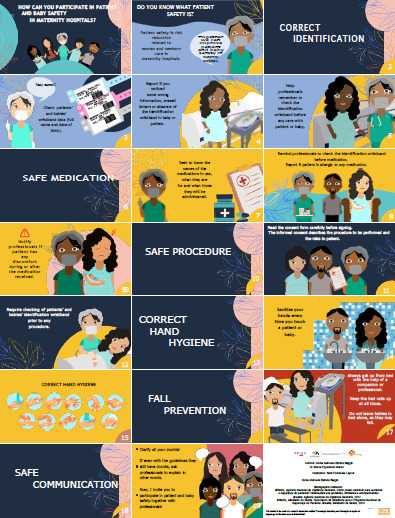
-
12-08-2023
Nursing experiences in specialized services in child and adolescent mental health: a systematic review of qualitative studies
Revista Brasileira de Enfermagem. 2023;76:e20220550
Abstract
Nursing experiences in specialized services in child and adolescent mental health: a systematic review of qualitative studies
Revista Brasileira de Enfermagem. 2023;76:e20220550
DOI 10.1590/0034-7167-2022-0550
Views1See moreABSTRACT
Objective:
to synthesize evidence from qualitative studies on nursing experiences regarding child and adolescent mental health care in specialized services.
Method:
a systematic review with meta-synthesis of qualitative studies according to JBI guidelines. CINAHL, EMBASE, MEDLINE, LILACS, PSYCinfo, Scopus and Web of Science databases were used. The findings were classified according to the level of reliability and credibility and categorized by similarity between contents.
Results:
229 articles were identified, and five were included in the final sample and organized into the categories: Emotional impact; and Understanding nursing role. The level of evidence found was moderate.
Final considerations:
nursing experiences are permeated by emotional exhaustion, feelings of frustration and difficulty in understanding their professional role. The need for training spaces that qualify this care is highlighted.

-
ORIGINAL ARTICLE07-19-2024
Validation of an instrument for assessing leprosy care in children and adolescents
Revista Brasileira de Enfermagem. 2024;77(2):e20230344
Abstract
ORIGINAL ARTICLEValidation of an instrument for assessing leprosy care in children and adolescents
Revista Brasileira de Enfermagem. 2024;77(2):e20230344
DOI 10.1590/0034-7167-2023-0344
Views1See moreABSTRACT
Objectives:
to validate the content of an instrument for assessing leprosy care in individuals under 15 years old in the context of Primary Health Care.
Methods:
methodological study of content validation, based on the evaluation of essential and derived attributes in primary care, in the professional version. For data analysis, the Content Validation Index (CVI ≥ 0.8) and Cronbach’s Alpha were calculated.
Results:
a higher percentage of judges among nurses (61.5%) was observed; with a doctorate (46.2%), and engaged in teaching and research (77%). The overall Content Validation Index of the instrument was 0.98. In the analysis of Cronbach’s Alpha of the instrument, the assigned value was 0.717.
Conclusions:
the instrument represents an advancement in the measurement of health evaluation policies and can significantly contribute to improving the quality of care provided to children and adolescents with leprosy.
-
ORIGINAL ARTICLE10-28-2020
Conflict management strategies used by Portuguese nurse managers
Revista Brasileira de Enfermagem. 2020;73:e20190336
Abstract
ORIGINAL ARTICLEConflict management strategies used by Portuguese nurse managers
Revista Brasileira de Enfermagem. 2020;73:e20190336
DOI 10.1590/0034-7167-2019-0336
Views0See moreABSTRACT
Objectives:
to analyze the perception and conflict management strategies used by nurses in the management of people in Portuguese health services.
Methods:
descriptive, correlational study, carried out in Portuguese health services, with an intentional non-probabilistic sample, totaling 95 nurse managers. A questionnaire and Conflict Management Scale were used, analyzing the variables of managerial activities and conflict management, with the aid of software.
Results:
it was identified that 60% of the managers, report having to mediate conflicts daily, and the majority report adopting dialogue in conduct. However, through the Kruskal-Wallis test, it was shown that enforcement strategies in conflict management prevail (p = 0.008), with collaborative ones being more restricted to monthly intervals (p = 0.049).
Conclusions:
managers perceive the importance of collaboration in the mediation of conflicts, however, in their daily lives; they tend to maintain imposing behaviors, signaling for a little transformational leadership style.

-
ORIGINAL ARTICLE10-01-2022
Frailty in the elderly: screening possibilities in Primary Health Care
Revista Brasileira de Enfermagem. 2022;75(2):e20200973
Abstract
ORIGINAL ARTICLEFrailty in the elderly: screening possibilities in Primary Health Care
Revista Brasileira de Enfermagem. 2022;75(2):e20200973
DOI 10.1590/0034-7167-2020-0973
Views0See moreABSTRACT
Objectives:
to evaluate two instruments for screening frailty in the elderly in Primary Health Care.
Methods:
this is an observational, cross-sectional study, with a quantitative approach, with 396 elderly people. SPSS software helped to perform the statistical analyses. The study used the kappa coefficient and Spearman’s correlation.
Results:
the kappa coefficient between the Clinical-Functional Vulnerability Index 20 and the Edmonton Frailty Scale was 0.496, considered moderate. There was a positive and significant correlation (r = 0.77; p < 0.001) between the frailty conditions and the total score of the two instruments.
Conclusions:
when this article assessed fragility through the kappa coefficient, both instruments presented positive correlation and agreement. However, the identification of frailty was higher when it used the Edmonton Frailty Scale.
-
ORIGINAL ARTICLE09-16-2019
Knowledge of nursing student on the prevention of sexually transmitted infections
Revista Brasileira de Enfermagem. 2019;72(5):1145-1152
Abstract
ORIGINAL ARTICLEKnowledge of nursing student on the prevention of sexually transmitted infections
Revista Brasileira de Enfermagem. 2019;72(5):1145-1152
DOI 10.1590/0034-7167-2017-0801
Views0See moreABSTRACT
Objective:
To identify the knowledge and self-care actions taken by nursing undergraduate students of a Federal University of the South of Brazil, against Sexually Transmitted Infections.
Method:
Exploratory qualitative study, conducted 40 interviews with undergraduate students at the beginning and end of the course. The analysis was thematic, resulting in three categories.
Results:
Knowledge about the subject is a decisive factor for self-care, and the more knowledge, the greater the prevention. The dissemination of knowledge of students at the end of the course not only influences self-care but also health promotion in the social sphere.
Final considerations:
Knowledge is important in self-care and caring for others. The dissemination of knowledge becomes evident according to the complexity of the course. Stable relationships may interfere with the use or disuse of condoms in sexual relationships, a misnomer present in today’s society.
-
ORIGINAL ARTICLE03-30-2020
Meanings assigned by families about children’s chronic disease diagnosis
Revista Brasileira de Enfermagem. 2020;73(2):e20180742
Abstract
ORIGINAL ARTICLEMeanings assigned by families about children’s chronic disease diagnosis
Revista Brasileira de Enfermagem. 2020;73(2):e20180742
DOI 10.1590/0034-7167-2018-0742
Views0See moreABSTRACT
Objectives:
to understand the meanings assigned by family caregivers about children’s chronic disease diagnosis.
Methods:
qualitative study, which used as theoretical framework the Symbolic Interactionism, and methodological, the Grounded Theory. It was held in a pediatric unit in Southern Brazil, in 2016, through interviews submitted to open and axial analysis, with the participation of 20 family caregivers of hospitalized children.
Results:
relatives, interacting with the nursing/health staff, perceive children’s disease at birth. They are diagnosed with chronic disease by the physician and deny it. Subsequently, they accept and seek information on care.
Conclusions:
the results pointed out the stages that relatives experience by assigning meanings to about children’s chronic disease diagnosis. These meanings provide subsidies for nurses’ actions, which need to be aware of children’s and family’s needs in order to offer comprehensive and humanized care.

-
03-09-2020
Psychiatric nursing and mental health teaching in relation to Brazilian curriculum
Revista Brasileira de Enfermagem. 2020;73(2):e20180200
Abstract
Psychiatric nursing and mental health teaching in relation to Brazilian curriculum
Revista Brasileira de Enfermagem. 2020;73(2):e20180200
DOI 10.1590/0034-7167-2018-0200
Views0See moreABSTRACT
Objectives:
to know the scientific production on psychiatric nursing and mental health teaching in relation to Brazilian nursing curriculum.
Methods:
an Integrative Literature Review with no temporal delineation, whose data collection took place in ten Brazilian and international databases, adding to the total 35 objects of analysis.
Results:
a priori categories were adopted, consisting of the psychiatric nursing and mental health teaching in Brazil according to the 1923, 1949, 1962, 1972, 1994 and 2001 nursing curriculum, presented in the light of the dimensions: thought model; places of practice; methods or contents used; and profile or skills of the student.
Final considerations:
the study made it possible to observe psychiatric nursing and mental health teaching historical evolution, indicating that teaching transformations involved changes in curriculum, Psychiatric Reform and the way nursing undergraduate courses and schools take these determinants.
-
08-19-2019
Professional education on dementias in Primary Health Care: an integrative review
Revista Brasileira de Enfermagem. 2019;72(4):1086-1093
Abstract
Professional education on dementias in Primary Health Care: an integrative review
Revista Brasileira de Enfermagem. 2019;72(4):1086-1093
DOI 10.1590/0034-7167-2018-0652
Views0See moreABSTRACT
Objective:
To investigate the most commonly used educational approaches in dementia training for primary health care professionals.
Method:
Integrative literature review, conducted between April and June of 2018, in PubMed, LILACS and IBECS databases. The descriptors used were: Training, Health Personnel, Dementia, Primary Health Care for PubMed; and the MeSH terms, Training Programs, Health Personnel, Dementia, and Primary Health Care for LILACS and IBECS.
Results:
The sample consisted of 13 articles; eight were published in the last five years (62%); seven articles with a quantitative approach (54%); seven articles produced on the European continent (54%), followed by five published on the North American continent (38%). All journals were from the health area (100%).
Conclusion:
Educational strategies were combined and used for education. Significant improvements in knowledge, skills, and attitudes of the teams with regard to professional management of dementias were evidenced.

-
05-21-2021
Quality of life and falls in elderly people: a mixed methods study
Revista Brasileira de Enfermagem. 2021;74:e20200400
Abstract
Quality of life and falls in elderly people: a mixed methods study
Revista Brasileira de Enfermagem. 2021;74:e20200400
DOI 10.1590/0034-7167-2020-0400
Views0See moreABSTRACT
Objective:
to assess elderly people’s quality of life, understanding the social representations of falls.
Methods:
a convergent mixed methods research carried out at homes, with a sample of 134 elderly people. A structured questionnaire was used, covering sociodemographic variables and factors that indicated frailty and risk of falling. For quality of life assessment, Medical Outcomes Study Short-Form 36 and Theory of Social Representations, Abric’s structural approach were used, with data treated by dictionary of equivalent terms, processed in Evoc 2000, converging analytically according to Neuman.
Results:
quality of life impairment was identified in terms of physical, emotional and functional capacity. The elements of the possible central nucleus were fall, fear, and bruised-broken-bone.
Final considerations:
quality of life impairment can contribute to increase the number of falls, which has been shown to be an event present in elderly people’s lives through evocations. Understanding elderly people’s individual demands allows planning actions.

-
ORIGINAL ARTICLE07-08-2020
Patient safety: perception of family members of hospitalized children
Revista Brasileira de Enfermagem. 2020;73(5):e20190525
Abstract
ORIGINAL ARTICLEPatient safety: perception of family members of hospitalized children
Revista Brasileira de Enfermagem. 2020;73(5):e20190525
DOI 10.1590/0034-7167-2019-0525
Views0See moreABSTRACT
Objectives:
to know the meaning attributed by family members to the health safety of pediatric patients, with attention to the possibilities of their collaboration.
Methods:
this qualitative study was conducted with eighteen family members of children hospitalized in a pediatric unit, from January to July 2018. Symbolic Interactionism was used as a theoretical framework, and Inductive Content Analysis as method.
Results:
child hospitalization poses risks to possible incidents and adverse events. Participants and professionals are responsible for patient safety. Thus, their actions focus on error prevention. Therefore, they seek information and observe in a vigil way professional care in classic aspects of safety. They conceive essential and favoring safety the approach centered on children and family members.
Final Considerations:
family members recognized the chances of errors and care damage, identified themselves as support in minimizing damage and were in partnership with the professional, increasing chances of effecting safety.
Search
Search in:
Nuvem de Tags
Enfermagem (930)Cuidados de Enfermagem (269)Atenção Primária à Saúde (239)Idoso (208)Educação em Enfermagem (151)Segurança do Paciente (150)Saúde Mental (145)Educação em Saúde (139)Estudos de Validação (131)Qualidade de Vida (104)Tecnologia Educacional (100)Promoção da Saúde (99)COVID-19 (91)Criança (91)Família (87)Enfermagem Pediátrica (86)Saúde do Trabalhador (86)Adolescente (85)Saúde Pública (82)Estudantes de Enfermagem (77)




